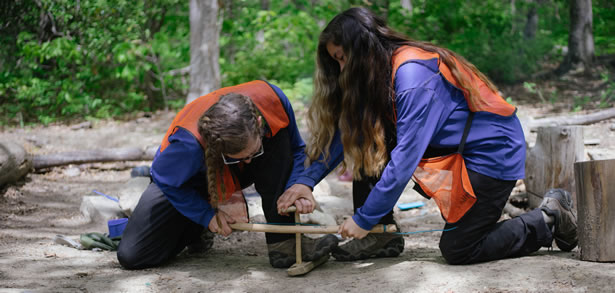How to Survive an Extreme Situation If You or a Loved One Has a Mental Disorder

We like to comfort ourselves with the thought that medicine has advanced so much that few things are still a mystery and that most, if not all, diseases can be resolved. There is only a category of diseases that still cause fear, confusion and anxiety, the ones about which people talk in a low voice – mental disorders.
Afflictions of the mind are in a way more severe than that of the body. While one type is visible and treatable from the outside, the other is locked away, invisible and personal but just as damaging. There are more than 200 classified forms of mental illness, most common among them being depression, bipolar disorder, dementia, and schizophrenia. Each has their own early warning signs and symptoms but in terms of cure, medicine is still lacking.
Without an immediate medical fix and only mild drug-based alleviation available, a person suffering from a mental disorder has to learn how to live with the disease. Just like a physical affliction, mental disorders often impair the most common and simple acts of life, making them harder or even impossible to do. Coping with an extreme situation if you or a loved one has a mental disorder is even more of a challenge.

The Added Difficulty
Schizophrenia, to take an example, visibly alters the behavioral patterns of an individual. Those suffering from it seem to have lost touch with reality, making hallucinations, delusions, thought and movement disorders a common occurrence. When dealing with a schizophrenic patient, doctors also look at who does schizophrenia affect beside him. Most often, loved ones have a hard time dealing with the dramatic behavioral change that the patient goes through.
Extreme situations make people with mental disorders particularly vulnerable as they cannot tend to themselves appropriately. As someone suffering from schizophrenia, to continue using this example, your grip on reality is already frail and fraught with side-steps into delusions. Any drastic change to the safety of the daily routine presents problems.
An extreme situation is by definition something wildly outside of the pattern of everyday life. As such, your mind will struggle to make sense of the unfamiliar environment. Establishing a proper course of action, such as hiding under the table or in the doorframe during an earthquake, becomes highly difficult.

Avoid
Despite common belief, physical strength is not essential in extreme situations. It is the brain, the very source of mental illness, which bears the weight of the added stress whenever such a situation arises. The right approach can make the difference between life and death and a brain suffering from a metal disorder has an inherent disadvantage when it comes to dealing with extreme situations.
As a person suffering from a mental disorder, it is easy to isolate yourself from others, even loved ones. This is a mistake and should always be avoided as an extreme situation will make you dependent on those around you. Be it a fire, tornado or earthquake, you will have to renounce a certain amount of autonomy and temporarily relinquish control of yourself to those around you. Most of all, panic and agitation from your part should be controlled.
Aside from the person suffering from the diseased mental condition, family and friends around him or her also experience a loved one becoming sick differently. Some outright deny the warning signs or worry because of the social stigma. Others adopt a condescending tone and treat people suffering from mental disorders as they would a helpless child.
As a relative of someone suffering from a mental disorder, you should avoid this kind of reaction that places even more emotional stress on the person in suffering. Blaming them for a situation that is completely out of their hands is neither fair nor helpful.
Studies have uncovered a positive association between conflict and depression and anxiety disorders, with up to 15-20% of those affected by a crisis developing mild to moderate mental disorders. Facing an extreme situation such as a terrorism, armed conflict or any kind of violent strife is even more difficult when one of your loved ones suffers from a mental disorder.
What you can do is to try to limit the stress that is placed directly upon them. When an extreme situation arises, avoid leaving a person suffering from depression or anxiety, for example, alone for large periods of time. They are totally dependent on you, the caretaker, for dealing with a source of stress which is largely unintelligible for them.

Survive
Dealing with a mental disorder in any sort of context is much like battling the elements. You are pitted against an implacable force that changes your environment and challenges you on an everyday basis. However, methods of coping are diverse and very effective.
As a person suffering from mental illness, your primary tools of survival in an extreme situation, your analytical and decision-making capacities, are severely impaired. The support of others will have to work as a crutch for you when dealing with a possibly hostile new environment.
As a loved one of someone suffering from a mental disorder, the first thing you need to do in order to help is to explain what is going on clearly. Understanding the new condition and the emergency you find yourselves in is essential for the person suffering from a mental disorder. This way, he or she can actually help instead of confusedly trying to understand what is happening.
Mental disorders can impede on the ability to deal with new situations. As part of the family or group of friends of someone suffering from a mental disorder, you need to step up and actively offer your help. Even if uneasy, with our help, your loved one will be able to deal with most situations. Talk to the person in suffering as you did before because in the end, they’re still the same person, only plagued by a terrible disease.
By following these general indications on what to do and what not to do during an extreme situation when you or someone you love has a mental disorder, you can survive most such situations. Conversely, offering support and assuming responsibility as a caretaker for someone who suffers from a mental disorder can save their lives.
![]()
About the Author
Mike Jones is a full-time writer with a great interest in health, nutrition, and sports. Mike is keen on experiencing as many as adventures in his life. Although he likes being prepared for anything, Mike doesn’t want to be facing an extreme situation anytime soon. More of his writing can be found on his Twitter and Facebook accounts.
All images and content provided by Mike Jones.
Images courtesy of Wikimedia Commons: Header image, Image 2, Image 3, Image 4.
--